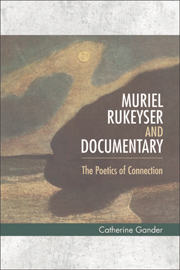4 - Documentary and the Emergence of American Studies
Published online by Cambridge University Press: 05 August 2013
Summary
It is necessary at this point to locate the sources of Rukeyser's engagement with documentary within a larger intellectual sphere of influence. This chapter examines Rukeyser's poetics as they developed contemporaneously with a new academic discipline, American Studies. By examining Rukeyser's work in the context of a burgeoning scholarly discourse and intellectual re-visioning of American literary and cultural history, I wish to provide a larger framework within which to locate her involvement with documentary than has hitherto been discussed, as well as allowing for a broader understanding of documentary expression in America beyond its arguable culmination in the art and literature of the 1930s.
The emergence of American Studies: a ‘usable past’
Although American Studies did not emerge as an academic subject until the 1930s, its founding ideology may be traced to the plea for an autonomous national literature during the first half of the 1800s, perhaps best sounded by Ralph Waldo Emerson. Emerson's call for a poet who might pull together the disparate parts of America into one unified voice was based on his understanding that America lacked a literary tradition that could afford the country true cultural heritage. His 1937 Harvard address, ‘The American Scholar’, articulated his contention that Americans had ‘listened too long to the courtly muses of Europe’ and must cultivate a national cultural independency based on lived experience: ‘We will walk on our own feet; we will work with our own hands; we will speak our own minds.’
- Type
- Chapter
- Information
- Muriel Rukeyser and DocumentaryThe Poetics of Connection, pp. 121 - 166Publisher: Edinburgh University PressPrint publication year: 2013



